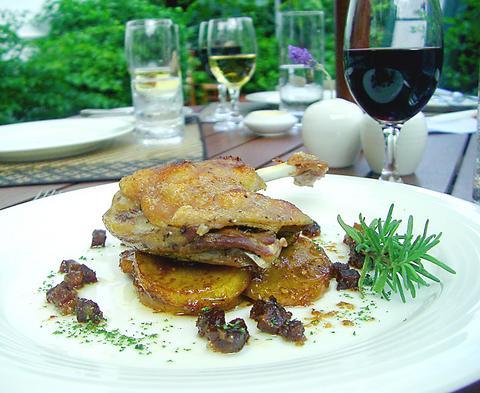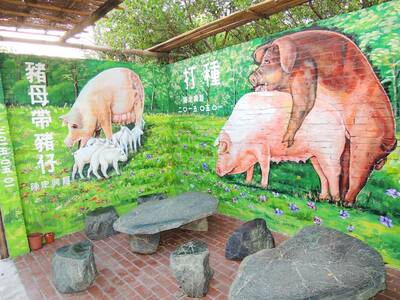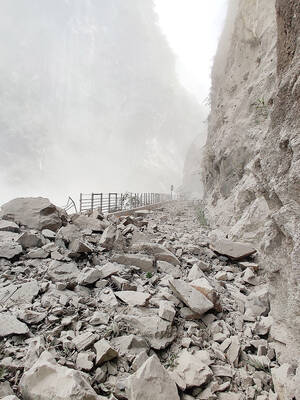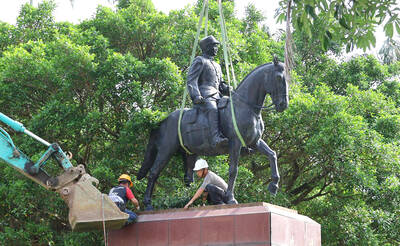Among the many French restaurants in Taipei, La Terrasse is one of a few that specializes in southwestern French delicacies, like duck and goose dishes.
As its name suggests, the restaurant features a pleasant terrace filled with beautiful flowers and herbs grown by the hostess Jocelyn Wang (
Despite the questionable manner in which the birds are stuffed, it is difficult to resist the fine and rich taste of duck meat from this region. The most popular dish at this 10 month-old restaurant is duck leg confit with sauteed potatoes (NT$480).

PHOTO: BY YU SEN-LUN, TAIPEI TIMES
This dish takes 28 hours to prepare and only experienced chefs know how to get it right. Joseph Lee (
In winter, the house presents another delicious southwestern French dish called lingot bean stew with sausage and duck confit.
Duck breast with green pepper sauce is another delectable sauteed duck dish. The duck breast is thick and slightly crispy on top, while the sauce is rich but with a hint of wine flavor.
The veal with moreal cream sauce is also impressive. Soucaille explains that his hometown is famous for its mushrooms. And this dish features the rich flavor of morel mushrooms. It's not as up-scale as Truffle, but it's equally delicious, especially with the veal.
La Terrasse also features a wide range of cheeses (Brie to St. Nectaire to Rocquefort, to name a few) and wines ranging in price from NT$1,150 to NT$7,000 per bottle.
Desserts here are the items that Wong and Soucaille are very proud of. All desserts are homemade and there are at least six items on the menu, the highlights being banana flambee with brandy and the orange crepes with orange liqueur and vanilla ice cream.

May 6 to May 12 Those who follow the Chinese-language news may have noticed the usage of the term zhuge (豬哥, literally ‘pig brother,’ a male pig raised for breeding purposes) in reports concerning the ongoing #Metoo scandal in the entertainment industry. The term’s modern connotations can range from womanizer or lecher to sexual predator, but it once referred to an important rural trade. Until the 1970s, it was a common sight to see a breeder herding a single “zhuge” down a rustic path with a bamboo whip, often traveling large distances over rugged terrain to service local families. Not only

Moritz Mieg, 22, lay face down in the rubble, the ground shaking violently beneath him. Boulders crashed down around him, some stones hitting his back. “I just hoped that it would be one big hit and over, because I did not want to be hit nearly to death and then have to slowly die,” the student from Germany tells Taipei Times. MORNING WALK Early on April 3, Mieg set out on a scenic hike through Taroko Gorge in Hualien County (花蓮). It was a fine day for it. Little did he know that the complex intersection of tectonic plates Taiwan sits

The last time Mrs Hsieh came to Cihu Park in Taoyuan was almost 50 years ago, on a school trip to the grave of Taiwan’s recently deceased dictator. Busloads of children were brought in to pay their respects to Chiang Kai-shek (蔣中正), known as Generalissimo, who had died at 87, after decades ruling Taiwan under brutal martial law. “There were a lot of buses, and there was a long queue,” Hsieh recalled. “It was a school rule. We had to bow, and then we went home.” Chiang’s body is still there, under guard in a mausoleum at the end of a path

Last week the Directorate-General of Budget, Accounting and Statistics (DGBAS) released a set of very strange numbers on Taiwan’s wealth distribution. Duly quoted in the Taipei Times, the report said that “The Gini coefficient for Taiwanese households… was 0.606 at the end of 2021, lower than Australia’s 0.611, the UK’s 0.620, Japan’s 0.678, France’s 0.676 and Germany’s 0.727, the agency said in a report.” The Gini coefficient is a measure of relative inequality, usually of wealth or income, though it can be used to evaluate other forms of inequality. However, for most nations it is a number from .25 to .50